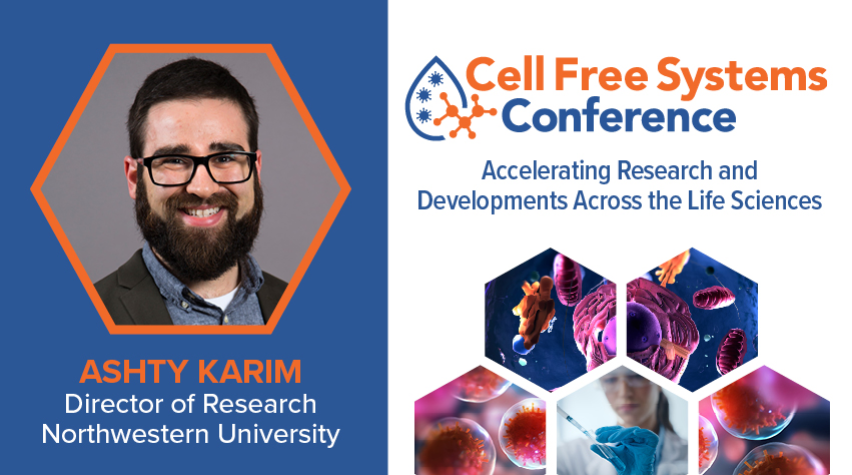
The 2nd Cell Free Systems Conference will be held November 15–17, 2023 in Austin, Texas. Organized by AIChE’s Society for Biological Engineering (SBE), the conference will provide a broad overview of the research and industrial applications in the field, including diagnostics, protein engineering, manufacturing, circuit design, synthetic cells, high-throughput characterization, fundamental research into chemistry of life, and other areas.
We chatted with Ashty Karim, the Director of Research for the Center of Synthetic Biology and a Research Assistant Professor of Chemical and Biological Engineering at Northwestern University, to discuss what topic he’ll be covering at the conference, career advice, advancements in the field, and more.
For the general audience, what distinguishes cell-free systems from other areas of bioengineering?
Cell-free systems do not compete with cell growth, providing engineers more control over biological processes. With direct access to cellular machinery, we can define the cell-free environment by adding and removing components as if you were assembling a chemical reaction.
What inspired you to do research in this field?
I was working in cells at first with the pipe dream that one day we’d have bioreactors that operated like touch screen soda machines, reprogramming on-demand. Working toward that in cells was frustrating to say the least. I discovered cell-free systems in graduate school, and the flood gates of research possibilities opened up.
What topic will you be addressing at the Cell Free Systems Conference?
I love enzymes and metabolism. I'll be discussing an entirely cell-free approach to engineer proteins. This approach allows us to take a promiscuous enzyme (a generalist) and create new enzymes with incredible substrate specificities (specialists) in parallel.
Are there any new developments, technologies, or applications of technologies in this field that you are particularly excited about?
Cell-free systems are emerging for uses in almost every subfield of biotechnology. I'm specifically excited for cell-free systems to stand on their own as biomanufacturing systems for proteins and small molecule chemicals, to be used more often to create hybrid enzymatic and chemical reactions, and create self-sustaining cell-free systems.
What advice would you give to students or young professionals thinking about a career in cell-free systems?
The possibilities of cell-free systems are seemingly endless. You can use cell-free systems to study biological processes, inform cellular systems through designing cell-free prototypes, or create entirely chemical and biological systems that could make lasting impact. The first steps are to read the literature, discuss with those in the field, and try out some research for yourself.
About SBE
Established in 2004, the Society for Biological Engineering is a technological community for engineers and applied scientists integrating biology with engineering. Members of SBE come from a broad spectrum of industries and disciplines and share in SBE’s mission of realizing the benefits of bioprocessing, biomedical, and biomolecular applications. Learn more about SBE.


